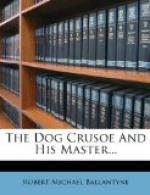Louder and louder it came, until an opening in the forest showed the advancing cavalcade to be a party of white men. In another moment they were in full view—a band of about thirty horsemen, clad in the leathern costume and armed with the long rifle of the far west. Some wore portions of the gaudy Indian dress, which gave to them a brilliant, dashing look. They came on straight for the block-house, and saluted the Varleys with a jovial cheer as they swept past at full speed. Dick returned the cheer with compound interest, and calling out, “They’re trappers, mother; I’ll be back in an hour,” bounded off like a deer through the woods, taking a short cut in order to reach the block-house before them. He succeeded, for, just as he arrived at the house, the cavalcade wheeled round the bend in the river, dashed up the slope, and came to a sudden halt on the green. Vaulting from their foaming steeds they tied them to the stockades of the little fortress, which they entered in a body.
Hot haste was in every motion of these men. They were trappers, they said, on their way to the Rocky Mountains to hunt and trade furs. But one of their number had been treacherously murdered and scalped by a Pawnee chief, and they resolved to revenge his death by an attack on one of the Pawnee villages. They would teach these “red reptiles” to respect white men, they would, come of it what might; and they had turned aside here to procure an additional supply of powder and lead.
In vain did the major endeavour to dissuade these reckless men from their purpose. They scoffed at the idea of returning good for evil, and insisted on being supplied. The log hut was a store as well as a place of defence, and as they offered to pay for it there was no refusing their request—at least so the major thought. The ammunition was therefore given to them, and in half-an-hour they were away again at full gallop over the plains on their mission of vengeance. “Vengeance is mine; I will repay, saith the Lord.” But these men knew not what God said, because they never read his Word and did not own his sway.
Young Varley’s enthusiasm was considerably damped when he learned the errand on which the trappers were bent. From that time forward he gave up all desire to visit the mountains in company with such men, but he still retained an intense longing to roam at large among their rocky fastnesses and gallop out upon the wide prairies.
Meanwhile he dutifully tended his mother’s cattle and sheep, and contented himself with an occasional deer-hunt in the neighbouring forests. He devoted himself also to the training of his dog Crusoe—an operation which at first cost him many a deep sigh.
Every one has heard of the sagacity and almost reasoning capabilities of the Newfoundland dog. Indeed, some have even gone the length of saying that what is called instinct in these animals is neither more nor less than reason. And in truth many of the noble, heroic, and sagacious deeds that have actually been performed by Newfoundland dogs incline us almost to believe that, like man, they are gifted with reasoning powers.




